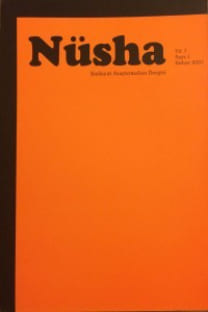MÜLEMMA VE ABDÜLVÂSİ-İ CEBELÎ
Mülemma, Abdülvâsi-i Cebelî, Fars Edebiyatı, Arap Edebiyatı, İran, Fars şiiri, Abdülvâsi-i Cebelî
Mulamma’ and ‘Abdu’l-Wâsi Jabalî
Persian Literature, Arabic Literature, Iran, Persian Poem, Mulamma’, ‘Abdu’l-Wâsi’ Jabalî,
___
- KAYNAKÇA‘Akkâvî, İn‘âm Fevvâl, el-Mu’cemu’l-Mufaṣṣal fî ‘Ulûmi’l-Belaga, Dâr’ul-Kutubi’l-İlmiyye, 2.bs, Beyrut 1996.el-Cevherî, İsmail b. Ḥammâd, eṣ-Ṣıḥâḥ,thk. Ahmed Abdulgafûr ‘Aṭṭâr, c.IV, Dâru’l-İlmi li’l-Melâyîn, 4.bs., Beyrut 1987.el-Ferâhîdî, Halîl b. Ahmed, Kitâbu’l-‘Ayn, thk. Mehdi el-Maḥzûmî, c.II, Dâr ve Mektebetu’l-Hilâl, Beyrut Bty. İbn Baṭṭûṭa, Ebû Abdullah, Rıḥletu İbn Baṭṭûṭa, nşr. Ekâdîmiyyetu’l-Memleketi’l-Magribiyye, c.II, Rabât 1417 h.İbn Dureyd, Ebûbekr b.el-Hasan, Cemheretu’l-Luga, thk. Remzî Munîr Ba‘lebekkî, c.II, Dâru’l-İlmi li’l-Melâyîn, Beyrut, 1987.İbn Manẓûr, Muhammed b. Ebû Faḍl, Lisânu’l-‘Arab, c.VIII, Dâru Ṣâdır, 3.bs, Beyrut 1414 h.er-Râdûyânî, Muhammed b.‘Omar, Kitâb Tercümânu’l-Belaga, nşr. Ahmed Ateş, İbrahim Horoz Basımevi, İstanbul 1949.Rasûlî, Hüccet, Mülemma’ der Şi’r-i Farsî, byy. 1396.Safâ, Zebihullâh, Tarîh-i Edebiyât der İran, c.II, 13.bs, Tahran 1373.Safâ, Zebihullâh, Divân-i Abdulvâsi’-i Cebelî Be İhtimâm u Teshîh u Te’lîk, İntişarât-i Emîr-i Kebîr, 2.bs, Tahran bty.eş-Şidyâk, Ahmed Fâris, et-Tuḥfetu’l-Behiyye ve’t-Ṭurfetu’ş-Şehiyye, Dâru’l-Afâḳi’l-Cedîde, Beyrut 1981.Tibyâniyân, Dânişnâme-i Edeb-i Farsî; Edebî Farsî der Afganistan, c.III, Tahran 1378.et-Tehânevî, Muhammed b. Ali, Keşşâfu Iṣṭılâḥâti’l-Funûn ve’l-‘Ulûm, çev. Abdullah el-Ḥâlidî, Beyrut 1996.Yakub, Emîl Bedî‘, Mevsûa‘tu ‘Ulûmi’l-Lügati’l-Arabiyye, c.IX, Dâr’ul-Kutubi’l-İlmiyye, 9.bs, Beyrut 2006.ez-Zemaḥşerî, Ebu’l-Kâsım, Esâsu’l-Belaga, thk. Muhammed Bâsil ‘Uyûnu’s-Sûd, c.II, Dâr’ul-Kutubi’l-İlmiyye, Beyrut 1998.
- ISSN: 1303-0752
- Yayın Aralığı: 2
- Başlangıç: 2001
- Yayıncı: Oku A.Ş.
MESNEVÎ’NİN POETİK BEYİTLERİ ÜZERİNE-I
BİR VEFA KİTABININ ÖĞRETTİKLERİ M. NAZİF ŞAHİNOĞLU, MAKALELER VE HATIRALAR
KLÂSİK İSLAM HUKUKU LİTERATÜRÜNDE ANTLAŞMA KAVRAMINI İFADE EDEN KAVRAMLARIN ÇEŞİTLİLİĞİ
TÜRKLERE FARSÇA ÖĞRETİMİ AMACIYLA HAZIRLANMIŞ BİR ESER: TUHFETU’L-‘UŞŞÂK
KARŞILAŞTIRMALI ARAPÇA ÖĞRETİM TEKNİKLERİ: GAZİ ÜNİVERSİTESİ İLE LONDRA ÜNİVERSİTESİ ÖRNEĞİ
ABBÂS MAHMÛD EL-AKKÂD (1889-1964)'IN HAYATI VE ESERLERİ
